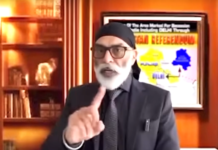
ON the 29th anniversary of the horrific bombing of Air India Flight 182, we reproduce two stories written by RATTAN MALL that we carried a few weeks ago:
MAY 31
RCMP refuse to give up in Air India bombing case: Six fulltime investigators and an analyst still pursuing leads
ALMOST 29 years after the horrendous bombing of Air India Flight 182 on June 23, 1985, off the coast of Ireland in which 329 people died and the Narita airport explosion in the luggage meant for another Air India plane in Japan on the same day in which two baggage handlers were killed, the RCMP are still pursuing a number of leads to try and nail some of those who are suspected to have been involved in the plot.
BC RCMP Communication Services Sgt. Rob Vermeulen, Senior Media Relations Officer, told me on Tuesday that six fulltime investigators and an analyst are still on the case.
The Air India team has the ability to draw upon resources from E-INSET to assist in the Air India investigation as and when required.
The Air India Task Force became an investigative team in June 2012 under the E-Integrated National Security Enforcement Team (E-INSET) that consists of a large number of police investigators.
Inderjit Singh Reyat was sentenced to 10 years in jail in 1991 for the manslaughter of two baggage handlers at Narita Airport and in 2003 he pled guilty to manslaughter in the bombing of Air India Flight 182. In January 2011, he was sentenced to nine years in jail for telling lies under oath in 2003 in the Air India trial. His testimony was part of a deal in which he pled guilty to the manslaughter charge.
In his 2003 testimony at the Air India trial, Reyat said that Talwinder Singh Parmar (who is considered the mastermind of the Air India bombing plot and who was apparently murdered by Indian police in Punjab before he could be charged by the RCMP) asked him to make an explosive device in 1984 and that he agreed because he was very upset at the way the Indian government had treated Sikhs. He said he bought material for the device and claimed that Parmar did not tell him what it would be used for.
(Next week marks the 30th anniversary of Operation Bluestar – the all-out attack on the Golden Temple in Amritsar, Punjab, in 1984 by the Indian Army with commandos and tanks to kill Jarnail Singh Bhindranwale and Sikh militants who had taken over the complex.)
In 2005, Ripudaman Singh Malik of Vancouver and Ajaib Singh Bagri of Kamloops were acquitted in the Air India bombings.
But in July 2012, B.C. Supreme Court Justice Ian Bruce Josephson, who also presided over the Air India bombing trial, ruled that “the acquittal of the applicant was just that; it was not a declaration of innocence” when Malik asked for reimbursement of more than $9.2 million for his legal fees in the Air India bombing trial. The judge added: “The media and public are free to read the judgment and come to their own conclusions.”
A source who was heavily involved in the court case told me this week that the RCMP could still come up with new evidence that could result in charges as some co-conspirator could always have a change of heart and agree to cooperate with police.
In fact, back in 2011, Robert Matas of The Globe and Mail newspaper told me that then-RCMP deputy commissioner Gary Bass, who was about to retire, mentioned an interesting angle to him that the RCMP were working on: “People who were afraid to speak over the period of years are in a different situation where the people they are afraid of die off, and it’s a bit of the police going around collecting deathbed repentance or deathbed statements to some extent … waiting for one person to die off and then another person will talk about it.”
There were also differences between Canadian and Indian police, who apparently had their own agenda.
For example, Bass also told Matas that although Canadian police at first accepted the conclusion of an inquiry in India that Parmar had been killed in a shootout, they later found out that he had been captured and tortured. It was only in 1997 that the RCMP discovered that Parmar allegedly made a confession, but Bass told Matas that the confession, which was made after torture, was unreliable.
Bass also revealed that India did not attach much importance to Parmar’s statements and told Matas: “India had put Air India behind them, that essentially was what we were told.”
Bass also said that Parmar identified Lakhbir Singh Brar, who had been a refugee in Canada and was later deported, as a central figure in the plot and that he was involved in the test blasts with Inderjit Singh Reyat. But Canadian investigators concluded that Brar was not involved in the bombings.
Matas reported at the time that while Indian police said that Lal Singh, the person in whose name one of the plane tickets had been booked in Vancouver, admitted his complicity in the bombing, Bass was less certain about Lal Singh, saying that although he had been interviewed many times over the years, Canadian police did not reach any definite conclusion.
Interestingly, Bass did not change his views about who the guilty are, telling Matas that the not-guilty verdict was “a very subjective analysis of credibility of witnesses.”
Bass told Matas that there are a bunch of things in the investigation that are “not known, but are knowable” – police do not know who checked in the luggage or to whom Reyat handed the bomb parts.
Bass said there were other things that were also being investigated, but did not mention them.
JUNE 7
Air India bombing case: RCMP have “some significant information” if they really have six fulltime investigators
REACTION to my story “RCMP refuse to give up in Air India bombing case: Six fulltime investigators and an analyst still pursuing leads” was one of surprise from readers who wanted to know if RCMP REALLY had six fulltime investigators and an analyst still working on the case.
Former solicitor general Kash Heed told me this week: “If they truly have that many [fulltime] people on it – and I really emphasize “truly” – then they’ve got some significant information that they’re following on.”
BC RCMP Communication Services Sgt. Rob Vermeulen, Senior Media Relations Officer, confirmed to me last week about the fulltime staff on the case. Also, the Air India team has the ability to draw upon resources from the E-Integrated National Security Enforcement Team (E-INSET) that consists of a large number of police investigators.
June 23 will mark the 29th anniversary of the bombing of Air India Flight 182 off the coast of Ireland in which 329 people died and the Narita airport explosion in the luggage meant for another Air India plane in Japan on the same day in which two baggage handlers were killed.
Heed told me: “The only thing from my point of view is, and I don’t have any intimate knowledge of this, but when you have that many people – if they say fulltime, [and] they’re not just trying to placate you to try and make you feel satisfied that they’re looking into it still, if they truly have that many people on it – and I really emphasize “truly” – then they’ve got some significant information that they’re following on.”
However, Kash added that if the RCMP didn’t have fulltime investigators on the case, then they were “just trying to say the case isn’t closed.”
ROBERT Gordon, Director of SFU’s School of Criminology, told The VOICE: “The fact they have fulltime [investigators] would suggest they are underscoring the fact that these are not just temporary staff or people who are doing other things.
“It may be that they’ve got some witnesses or some leads that the rest of us are not privy to that they think are worthwhile pursuing and they are waiting for (some) success.
“In many respects senior police forces are like elephants, they never forget. They just keep the files going and sometimes – usually it’s a result of luck – the evidence appears. Somebody comes along who didn’t come along before and they say here’s some information that clearly points to a particular individual – that’s sort of how they operate.”
Gordon also pointed out that the case “wasn’t solved by conviction” and added: “Oftentimes police would have gathered enough evidence to satisfy themselves that a particular person or group of people are guilty of illegal activity but not have enough to convince Crown counsel that they should proceed to prosecute because the politics of it are such that you don’t want to go unless you are going to get a conviction.
“Also if you lose the case for want of good evidence, that actually works in the favour of the alleged offenders because they can then publicly say ‘well look, I was found not guilty in this” when there might well be substantial investigative proof but not proof beyond a reasonable doubt that would secure a conviction.
“So they will keep going. They will keep the file open and they will keep looking.”
WHEN I asked Gordon if having fulltime investigators still on the case suggest that the RCMP were really serious about it, he replied: “Well, they are serious about it, that’s for sure, but if for no other reason than politics because it was such an extraordinary crime – mass murder – and it obviously affected a large number of people, particularly in this part of the world.
“And so for the police to turn around and say well, we’ve basically given up now, we’re not going to be pursuing this anymore – for them to do that would be to court disaster amongst the Indo-Canadian community in particular and in this neck of the woods in particular. You can see a lot of outrage flowing from a decision to shut it all down.
“There are those two competing considerations.”













Comments are closed.